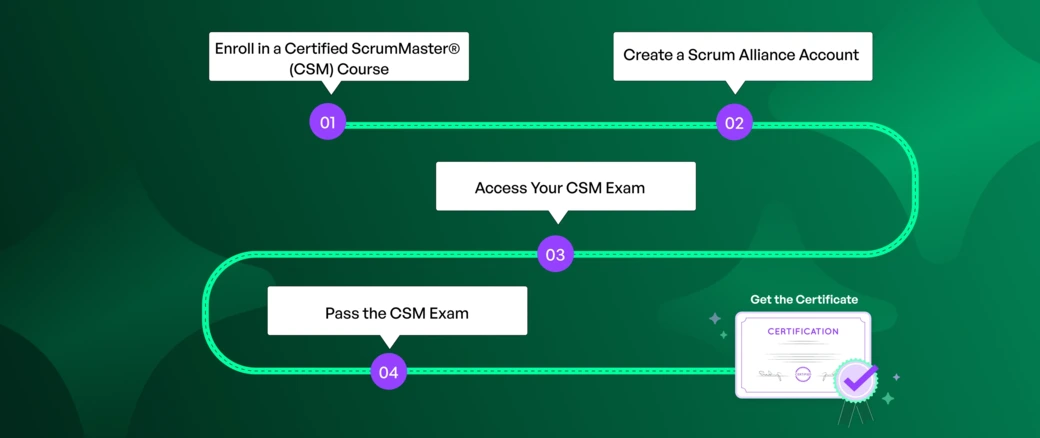Overview of CSM Syllabus
To become a Certified Scrum Master, you must complete a two-day training course covering the essential knowledge and skills required to implement Scrum effectively in your organisation. This training is a prerequisite for taking the certification exam. The CSM course content, designed by the authorised training centre, provides a comprehensive overview of the CSM certification syllabus based on Scrum principles and practices, ensuring you're well-equipped to pass the exam and apply Scrum in real-world scenarios. Here’s the certified Scrum Master course content to follow:
1. General Knowledge of Scrum
The CSM course covers the foundational principles, basic concepts, and values of Scrum, including Agile philosophy, empirical process control, and self-organisation. You'll learn about Scrum's history, core components, and the benefits of implementing it in various projects. This section also explores the role of a Scrum Master in facilitating team collaboration, removing impediments, and ensuring the Scrum framework is followed.
2. Scrum Roles
This section dives deep into the three primary roles in Scrum: Product Owner, Scrum Master, and Development Team. You'll learn about the responsibilities and expectations of each role, including:
- Product Owner: Prioritising the Product Backlog, ensuring it aligns with stakeholder needs, and making decisions about product features.
- Scrum Master: Facilitating Scrum events, removing barriers, and coaching the team on principles and practices.
- Development Team: Collaborating on Sprint tasks, delivering working software, and continuously improving processes.
3. Scrum Meetings
Scrum events or meetings are essential for inspection, transparency, and adaptation. Here you will learn:
- Sprint planning: Sprint Planning is a critical event where the team sets goals and tasks for the upcoming Sprint. You'll learn the importance of clear goal-setting, task estimation, and commitment to achieving Sprint objectives. Effective Sprint Planning ensures that the team understands what needs to be accomplished and can plan their work accordingly.
- Daily Scrum: The Daily Scrum is a meeting where team members share progress, discuss challenges, and plan their work for the day. During the daily scrum, you'll learn about the importance of effective communication, active listening, and problem-solving. This event helps the team stay focused, aligned, and motivated.
- Sprint Review: The Sprint Review is an opportunity for the team to showcase the work completed during the Sprint, gather feedback, and adjust the Product Backlog as needed. You'll learn the importance of practical demonstration, feedback gathering, and adaptation. This event helps stakeholders understand progress and allows the team to receive feedback and adjust their approach.
- Sprint Retrospective: The Sprint Retrospective is a reflective event during which the team identifies areas for improvement and implements changes for future Sprints. You'll learn about the importance of self-reflection, continuous improvement, and experimentation. This event helps the team identify and address process improvements, leading to increased efficiency and effectiveness.
4. Scrum Artefacts
Scrum artefacts are tools used to manage and track progress in Scrum projects. It provides transparency and opportunities for adaptation and inspection. Here you will learn about:
- Product Backlog: The Product Backlog is a prioritised list of features, requirements, and tasks that need to be completed. You'll learn the importance of effectively prioritising, refining, and maintaining the Product Backlog. A well-maintained Product Backlog ensures that the team clearly understands what needs to be accomplished and can plan their work accordingly.
- Sprint Backlog: The Sprint Backlog is a subset of the Product Backlog items selected for the current Sprint. You'll learn the importance of effective task breakdown, estimation, and commitment to achieving Sprint objectives. A well-planned Sprint Backlog ensures that the team clearly understands what needs to be accomplished during the Sprint.
- Increment: The Increment represents the working software delivered to stakeholders at the end of each Sprint. You'll learn the importance of providing high-quality software, meeting stakeholder expectations, and continuously improving the Increment. and also know about the CSM Certification Study Guide.
5. Scaling Scrum
Scaling Scrum involves applying Scrum principles to larger, complex projects. One technique for achieving this is Scrum of Scrums, where representatives from multiple teams meet to coordinate work, address dependencies, and resolve issues. Here, you will learn the importance of effective team communication, coordination, and problem-solving.
- Coordinating Across Teams: A meeting of Scrum Masters from multiple teams to coordinate work and address dependencies.
- SAFe (Scaled Agile Framework): A framework for applying Agile and Scrum principles at the enterprise level.
- LeSS (Large-Scale Scrum): A framework for scaling Scrum to large, complex projects while maintaining the core principles of Scrum.
How to Prepare for the CSM Syllabus?
Attend a CSM course: Enroll in a 2-day CSM course offered by a certified Scrum Alliance-approved training partner.
Study Scrum Guide: Read the official Scrum Guide, which provides a comprehensive overview of the Scrum framework, roles, events, and artefacts.
Review the Scrum Master certification syllabus: Learn all the chapters of the CSM syllabus.
Practice with case studies: Practice applying Scrum principles to real-world scenarios through case studies or group discussions.
Take online mock exams: Take online practice exams to test your understanding of the CSM syllabus.
Join online communities: Participate in online Scrum communities, forums, or social media groups to stay updated on Scrum best practices and learn from others.
FAQs
Is the Certified Scrum Master syllabus focused only on theoretical knowledge?
The CSM syllabus combines theoretical knowledge with practical applications, including case studies and group discussions.
What are the key Scrum roles covered in the CSM syllabus?
The CSM syllabus covers three key Scrum roles: Product Owner, Scrum Master, and Development Team.
Does the Certified Scrum Master syllabus include information on scaling Scrum?
Yes, the CSM syllabus includes information on scaling Scrum, including frameworks like Scrum of Scrums.
Is the Scrum Master certification syllabus suitable for professionals from non-technical backgrounds?
Yes, the CSM syllabus is designed to be applicable across various industries and professions, not just technical backgrounds.















